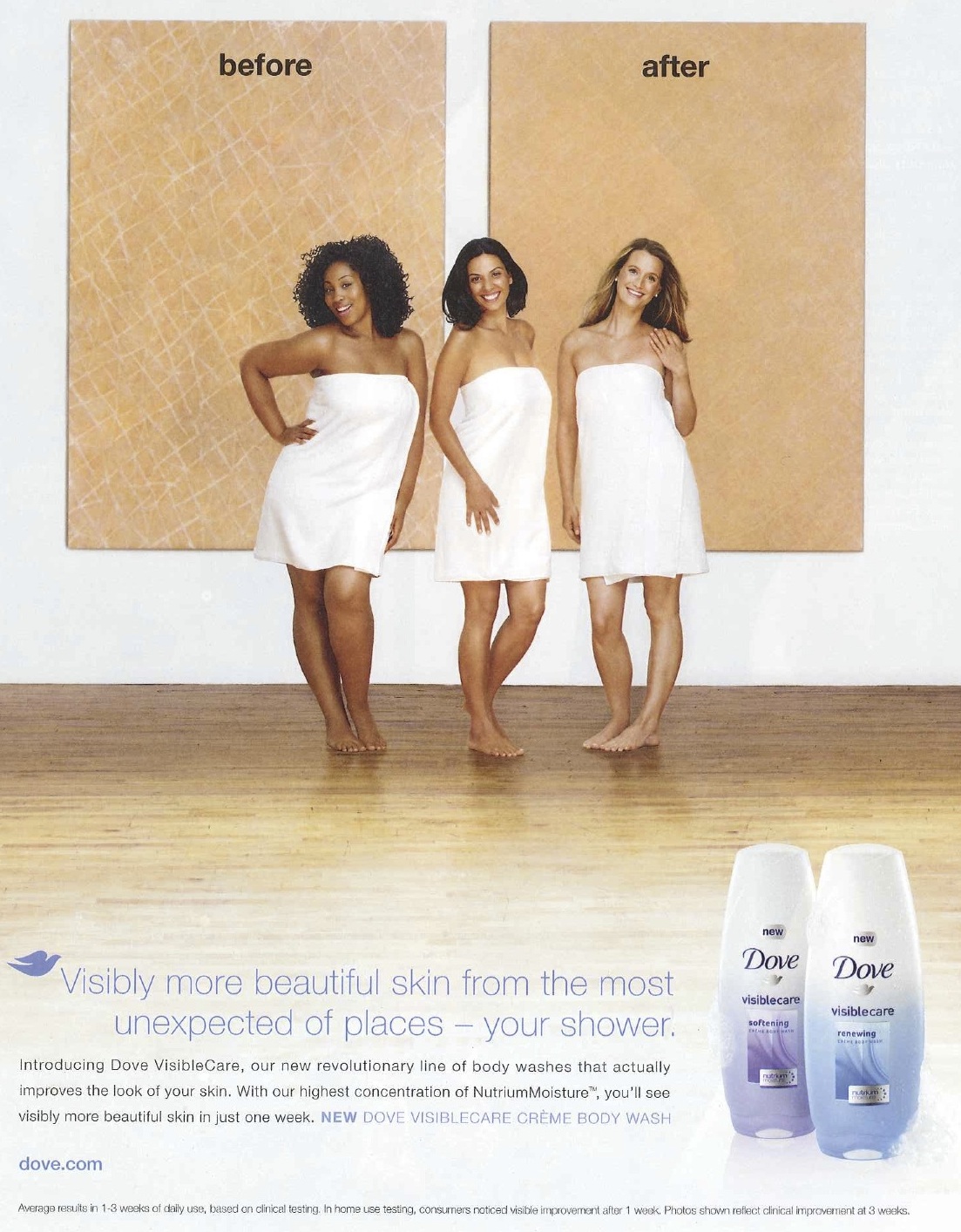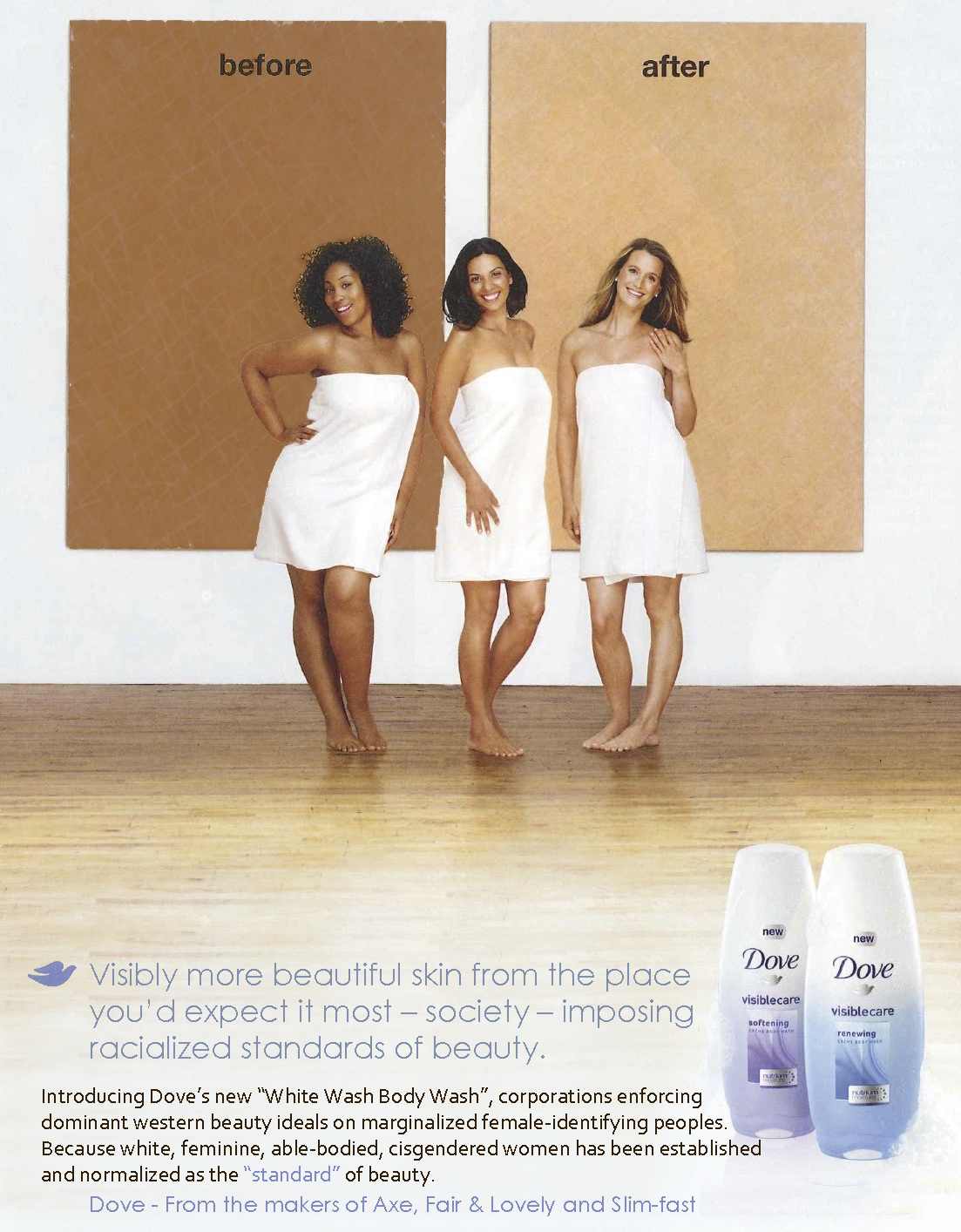Dove’s Racialized Beauty Standards
 The Original DOVE Advertisement
The Original DOVE Advertisement
In 2011, Dove released this advertisement for their “VisibleCare” body wash. This advertisement shows three women — one black, one Latina, and one white — standing in front of “before” and “after” signs to promote their new moisturizing bath product. The advertisement places the three women on a colour gradient, from darkest to lightest, with the lightest woman suggested as the end result. Although intending to show the benefits of using the product to combat dry skin, Dove’s advertisements unintended message implies the concept of purification of skin colour with whiteness as the desired outcome. This advertisement is an example of cultural racism, demonstrating stereotypical perceptions about race. Through tokenizing the individuals in the ad, racist categories and hierarchies are perpetuated. In addition, this advertisement is exclusionary and denies gender diversity, enforcing colonial gender binaries through only displaying cisgendered women. This contributes to the structural violence against LGBTQA2+ peoples. The slogan for Dove’s VisibleCare, “Visibly more beautiful skin”, also proves to be an issue in itself. Dominant society has constructed standards of what constitutes beauty, measuring people against Eurocentric standards. In addition, the advertisement contains levels of sexuality and objectification as the women are merely wrapped in a bath towel. Unilever is the parent company of Dove, as well as other controversial companies such as Axe. This highlights an issue of the intentions of the corporation as a whole. Although Dove aims to promote body positivity and female empowerment, many of Axe’s ads utilize sexual appeal to market their products. These hypocritical positions seem to reflect a core ideology of Unilever: exploitation of insecurities as a marketing tool for capital gain. Finally, I believe that the unintended message in the advertisement reflects a lack of diversity of Unilever executives. The “overlooked” mistake highlights that women and people of colour continue to be vastly under-represented as decision makers at large companies.
My jammed version of the Dove advertisement
I had so many things to flesh out in this Dove VisbleCare advertisement. My initial idea was to neutralize the issues rather than accentuate them. However, I found that stressing these points of conflict highlighted the problems of the advertisement more effectively. In addition to changing the text on the ad, I altered the signs to heighten the racialized message. The complex racial hierarchy is demonstrated through the categorization of the women. This advertisement centres socially constructed, Eurocentric beauty ideals, which idealize thin, young, white, cisgendered, able-bodied women. These dominant ideals of society can reinforce the systemic oppression of marginalized communities. In addition, although Dove aims to uphold and promote body positivity through displaying diversity, their ad continues to reflect normative tropes of beauty. Their ad fails to widen the perceptions of beauty through showcasing model-like women, despite their intent to display multiplicities of people. As stated before, the global corporation Unilever owns Dove, as well as Axe, Fair and Lovely and Slim-fast. The hypocritical positions of their many companies seem to reflect a core ideology of Unilever: the exploitation and corruption of consumers as a marketing tool for capital gain. Unilever is amongst the worst offenders for plastic pollution, a supporter child labour palm oil and Monsanto, tests on animals with an aggressive carbon footprint (Newint, Huffington Post, Plant Based News). The goal of my culture jam project was to urge the consumer to not only think about their advertisements, but to think critically about where they spend their money. There needs to be a greater awareness of corporations as a whole in order to consume responsibly.
Empowerment isn’t a beauty product. Where are everybody soaps and body washes?
Sources:
https://www.today.com/style/dove-body-wash-ad-stirs-controversy-flna1C8368826
https://www.plantbasednews.org/post/opinion-unilever-is-not-cruelty-free-until-it-stops-selling-in-china
https://newint.org/features/web-exclusive/2017/04/13/inside-unilever-sustainability-myth
https://www.huffingtonpost.com/entry/unilever-falls-short-on-labor-rights_us_592e2089e4b047e77e4c3f89

